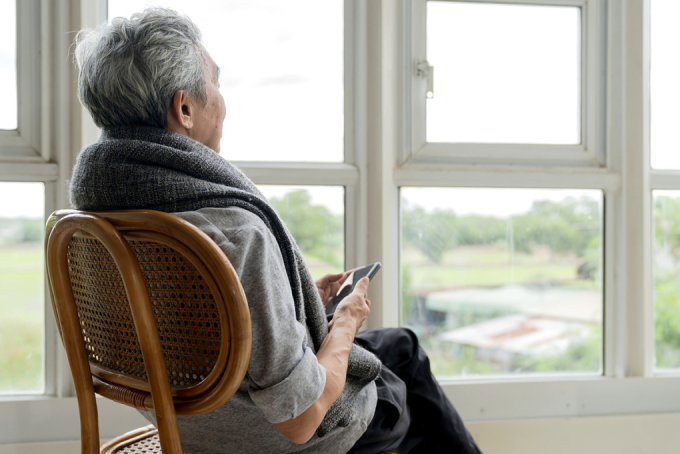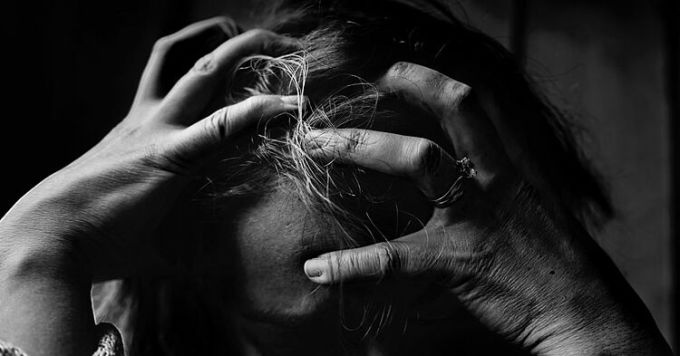Hanoi In just a few months, depression pushed Ms. Loan, 56 years old, to the brink of suicide, when the initial symptoms were just loss of appetite and sadness.
The 56-year-old woman, a retired official, currently lives alone in Tay Ho district, while her son is working in Ho Chi Minh City. Her marriage broke down when she was 35, and since then she has struggled to raise her child, and her mental life has been full of stress.
At the beginning of this year, she began to feel depressed, restless, had a poor appetite, had insomnia, and felt tired. Thinking that her mental and physical health were changing due to age, Ms. Loan tried to exercise and take some supplements to improve her resistance. A few months later, the condition became more serious, the woman lost all interest and became indifferent to both the dog and cat, who used to be with her every day. She no longer cared about taking care of herself, withdrew into her apartment, and avoided all social interactions.
Sensing his mother's change in temperament, Mr. Hung tried to persuade her to move to Ho Chi Minh City to live with him, but she refused, saying she "needed time to prepare." In June, he was shocked to hear her confide that she had attempted suicide. Although he called his mother frequently, he did not understand what was happening.
"I was stunned," he said and decided to stop all work and return to Hanoi, taking his mother to Mai Huong Daytime Psychiatric Hospital for examination.

Depression - a disease that causes serious consequences if not examined and treated promptly. Photo: Freepik
According to Medical Daily , depression is a mood disorder characterized by persistent feelings of sadness, loss of interest in previously enjoyed activities, and an inability to complete daily tasks for at least two weeks. Other symptoms include anxiety, irritability, sleep disturbances, lack of energy, changes in appetite, and thinking problems. Depression is a leading cause of suicide. Each year, about 850,000 people die from the disease, according to statistics from the World Health Organization (WHO).
Depression and anxiety disorders are currently prevalent in Vietnamese society, with an estimated 6 million people suffering from the disease, according to 2022 statistics. Deputy Minister of Health Tran Van Thuan said that the rate of mental disorders in our country accounts for 14.9% of the population, equivalent to nearly 15 million people. Depression and anxiety account for a high rate of about 5-6% of the population, the rest are other disorders such as bipolar disorder, mental disorders related to alcohol, drug and other addictive substances.
According to Dr. Tran Thi Hong Thu, Deputy Director of Mai Huong Mental Hospital, depression in menopausal women (aged 45-55) is quite common. A study showed that 36% of women in this age group suffered from insomnia, 37% had anxiety disorders, and 20-40% had signs of depression. The risk of developing the disease is higher in women with a history of depression or previous psychological disorders. In particular, this is a disease that all women are at risk of developing at almost any stage of their lives.
These figures are consistent with global studies that show depression rates are twice as high in women as in men, according to the US Centers for Disease Control and Prevention (CDC). The Covid-19 pandemic has exacerbated acute and chronic stress and damaged the mental health of millions.
In 2020, the number of people with anxiety and depression disorders increased by about 25%, leading to an increase in suicides. Many people with mental disorders do not have access to effective care, increasing the treatment gap. Only 29% of people with mental disorders and 1/3 of people with depression receive formal mental health care. Therefore, experts call the disease a silent killer, destroying the lives of many people.
Dr. Thu believes that the cause of depression in middle-aged women may be due to a decrease in hormones (estrogen and progesterone), which affects the functioning of the nervous system and creates psychological effects. In addition, decreased sexual activity, difficulty sleeping, fatigue and changes in brain structure may also play a role in causing the disease. Menopause is often accompanied by many stresses in life, such as children growing up, retirement, death of a loved one or changes in relationships, which increase the risk of developing depression.
Sharing the same opinion, Dr. Le Ngoc Thien, Institute of Mental Health, Bach Mai Hospital, said that many cases were normal, smiling and talking happily, but when they stopped menstruating, their mood suddenly changed. In addition, the change in appearance, skin gradually darkened, wrinkled, and illness came, making women become self-conscious.
According to experts, the problem becomes more serious when social pressure makes Vietnamese women, especially the elderly and middle-aged, rarely admit that they have psychological problems. "They do not want to show their sadness, always trying to be strong, to be a support for their children and grandchildren," said Dr. Thu.
On the other hand, mental illness is a sensitive issue and is subject to discrimination. Many mentally ill patients are shunned, confined at home or placed in long-term care facilities. Most patients have negative perceptions of treatment and do not dare to tell colleagues or family that they are ill, for fear of being judged.
Therefore, both patients and their relatives often do not realize the seriousness of the problem. Many people hide it, or only when the disease becomes serious, to the point of wanting and having suicidal behavior, do they go to the hospital for examination. "Mrs. Lan's story shows that the problem of menopausal depression is very serious, it can be considered a 'silent killer', and needs to be recognized correctly," said Dr. Thu.

There are many causes of depression in middle-aged women, including hormonal changes. Photo: Psychology today
According to experts, the key to solving menopausal depression is to change the perspective on mental health issues in older people. Understanding the psychophysiological disturbances as well as accepting depression as a disease like other chronic diseases such as diabetes, high blood pressure... helps women as well as their families cope effectively.
In addition, women need to change their lifestyle to adapt to menopause, including eating in moderation, exercising, and taking care of their mental health. Things to do include: increasing rest, maintaining regular sleep habits, participating in outdoor activities, exercising regularly such as walking, running or dancing, relaxing with yoga, tai chi, and meditation.
In particular, in cases where there are severe menopausal symptoms and at the same time encountering family and work events, early examination and screening for depression is needed. Treatment methods can be with or without medication, depending on the severity and individual.
Mrs. Loan was lucky to have her son take her for treatment early, and the signs of depression, loss of appetite, and insomnia gradually subsided after a month of taking the medicine. Mr. Hung asked for unpaid leave, planning to take his mother on a trip and visit his hometown to visit relatives.
"I feel happy that my mother is still by my side," he said, adding that he will accompany Ms. Lan to fight the disease.
Thuy Quynh - Ngoc Huyen
*Character names have been changed
Source link


![[Photo] Vice President Vo Thi Anh Xuan, French President Emmanuel Macron and his wife visit Hanoi University of Science and Technology](https://vphoto.vietnam.vn/thumb/1200x675/vietnam/resource/IMAGE/2025/5/27/267b6f2bdf3e46439f081b49f6ec26b1)


![[Photo] Hungarian President begins official visit to Vietnam](https://vphoto.vietnam.vn/thumb/1200x675/vietnam/resource/IMAGE/2025/5/27/ab75a654c6934572a4f1a566ac63ce82)




























































































Comment (0)